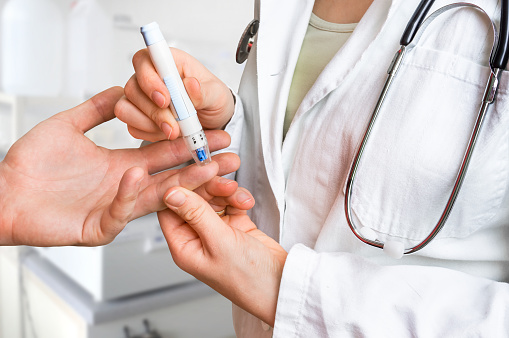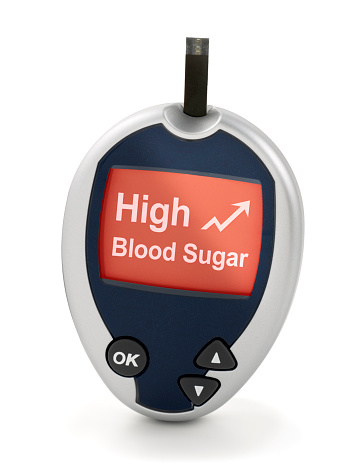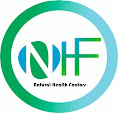High blood sugar (Hyperglycemia)-Symptoms, Causes, Treatment, and Prevention:
What is Blood sugar?
What is blood sugar: Blood sugar called glucose is the main
source of energy for the cells of our body. This type of sugar is present in flour, honey, carrots, rice, etc. among others.
This source of energy makes it possible to perform important
body functions such as digestion, heart pumping, and synapses. In the body, the
regulation of blood sugar is ensured thanks to permanent balance different
mainly hormonal substances.
What is blood sugar normal range?
What is blood sugar
normal range: Our blood sugar levels need to be between 70mg/dL and 110mg
/dL.
What is hyperglycemia?
What is hyperglycemia:
hyperglycemia is defined as blood sugar (blood sugar levels) above the target
values for the majority of people with diabetes.
It occurs when the amount of insulin in the blood is
insufficient or ineffective since glucose (sugar) cannot enter cells due to a
lack of insulin; it accumulates in the blood and raises blood sugar.
It is important to consult a doctor so that he or she can
prescribe medication and he or she can tell you about changes in your diet as
well as keep up your daily exercise.
Causes of high sugar in blood:
High sugar in blood causes:
The most common cause of chronic hyperglycemia is diabetes. High sugar in blood causes infectious
or hepatic disease or inflammatory syndrome. Hyperglycemia is common in the
acute phase of severe illness.
Causes of high sugar in blood:
Diet: Glucose
after meals (2 hours after meals) may be higher in your diet depending on the
amount of carbohydrates in your diet. The more carbohydrates, the higher the
amount of sugar in the blood.
Glucose excretion by
the liver: The liver releases glucose into the blood without taking
nutrients for at least 8 hours, leading to hyperglycemia. This explains why in
some people, hyperglycemia occurs on an empty stomach in the morning, even if
no food is taken. Beware of misconceptions: it is not associated with heart disease
the day before!
An insulin pump failure that prevents insulin injection.
Dehydration
This disease: cold, flu, or fever.
Some emotions: stress or anger.
Some medications: Cortisone, for example, has side effects of raising blood sugar.
Read also: All about Gout-Main causes, Purine-rich foods, Low purine diet and Medication
When sugar is high symptoms:
When sugar is high
symptoms: If you do not have diabetes and you are healthy, you will be
tested for hypoglycemia even if you experience the above symptoms. Your doctor
will take a blood sample to check your blood glucose level.
If you have diabetes, your doctor will ask you about your
medication (such as your insulin dose), your activities, and your diet.
Hypoglycemia can occur if a person with diabetes uses excessive amounts of
insulin or insulin-producing drugs, or if they use excessive amounts of blood
sugar without first recovering.
The Canadian Diabetes Association recommends that a person who uses insulin or takes anti-diabetic drugs that stimulate insulin
secretion do not let their blood glucose levels fall below 4.0 mm / L (722 mg /
dL).
The Canadian Diabetes Association classifies hypoglycemia as
follows:
Mild - the onset of
symptoms due to excessive release of adrenaline. The infected person can take
care of himself.
Moderate -
Excessive release of adrenaline and inadequate supply of glucose to the brain
manifests symptoms, but the infected person can treat himself.
Serious - The
infected person needs the help of another person. Blood glucose levels are
usually less than 2.6 mm / L (50 mg / dL).
When sugar is high what is the symptoms:
When sugar is high
what is the symptoms: Hyperglycemia has symptoms that are difficult to
detect without minimal attention. It is ideal to have a medical checkup every
six months to identify any possible changes in the body over time.
Testing to measure blood glucose levels is usually cheap and
easy. One light bite is enough to get a drop of blood.
Above a certain threshold, hyperglycemia can be signaled by
a variety of symptoms of hyperglycemia:
1. Polydipsia:
Polydipsia is a necessary and urgent exaggeration of
drinking water, usually accompanied by a dry mouth.
It is important that you drink water as soon as you need it
since thirst is what the body needs to normalize glucose levels.
But keep in mind that as long as the blood sugar level is
high, the problem will continue. To remedy this, practice a daily exercise
routine and take the medications prescribed by your doctor.
2. Wounds on the skin:
Too much sugar in the blood can cause skin lesions such as
coffee-colored spots on the feet as well as redness of the face and increase
the dryness of the skin.
Also, nails, palms of the hands and third parts of the feet
may contain yellow color.
If you notice the presence of sores that disappear after a
while, go to your doctor. Do not ignore this problem, as it may be a sign of
venous damage.
3. Mood swings:
People who suffer from hyperglycemia often experience severe
mood swings such as boredom or depression.
Emotion depends on the chemical processes in the brain; these
processes are affected by blood sugar levels.
4. Weakness and drowsiness:
As cells are unable to absorb sugar from the blood
efficiently, the energy produced is reduced. This results in the presence of
the following symptoms:
- A feeling of muscle weakness
- Extreme fatigue
- A state of comfort
- Ignorance mantra
To reduce these symptoms of hyperglycemia, it is important
to consume enough fresh vegetables, providing adequate amounts of vitamins and
minerals. If the problem is more serious, your doctor may advise you on some
dietary supplements.
5. Wounds heal slowly:
High sugar in blood
causes severe obstruction of blood clotting. This deterioration is
manifested by the presence of wounds and sores on the skin as well as the
gradual healing of the sores.
If you notice that your wounds are bleeding more than usual
and it takes time for your scars to disappear, there are steps you should take.
When your blood glucose level returns to normal, this symptom will go away.
6. Vision problems:
The small arteries and veins in the retina, the macula (or
yellow spots), the retinal vessels, and the head of the optic nerve are usually
damaged as a result of hyperglycemia.
Here are some
examples of problems:
- Blurred vision
- The presence of dark spots in the visual field
- Pain in the eye area
- Problems locating distant objects,
- lateral or peripheral vision
7. Headache:
Headache can causes
of high sugar in blood, and one person who is severally affected by
chronic headache, this person should take doctors consultation and
recommendation.
READ
ALSO: 12 Best home remedies for headache
8. Weight loss:
High sugar in blood causes weight loss and the person who
suffers from it does not lose his appetite.
9. Sexual problems:
Damage to nerves and blood vessels as a result of high sugar in blood causes various
changes in sexual function in both women and men.
Hyperglycemia in men may have the following functional
causes:
Achieving a disability or having sex to maintain a building
firm enough
During ejaculation, the ejaculation does not move towards
the end of the penis but turns towards the bladder
In women,
hyperglycemia can cause the following dysfunction:
- Vaginal dryness
- Absence or decreased sexual desire
- Painful intercourse
Do you have these symptoms of hyperglycemia? If so, do not
ignore them and see your doctor as soon as possible.
Risk factors for hyperglycemia:
The risk factors for
hyperglycemia due to type 1 diabetes is a genetic predisposition, for type 2
diabetes, genetic predisposition to being overweight
/ obese, sedentary lifestyle, high blood pressure, etc.
It is possible that a healthy person may develop
hypoglycemia under certain conditions. For example, skipping meals can
significantly lower blood sugar levels and cause unpleasant symptoms.
There are several
causes of high sugar in the blood, including people with diabetes:
- Lack of education about hypoglycemia and its treatment;
- Advanced age;
- Presence of renal or hepatic insufficiency;
- Not practice plans;
- Omitted or delayed meals;
- Alcohol consumption in the absence of adequate food intake;
- Taking other medications;
- Drug dose errors, especially insulin.
Treatment of hyperglycemia:
Treatment of hyperglycemia: Patients with mild to moderate hypoglycemia are usually
aware. The main treatment then involves the administration of a type of
carbohydrate of sugars. Give 15 grams of carbohydrates, and then wait for 15
minutes.
After this period, it is necessary to measure blood sugar if
it is normal, but it is to say that it is more than 4 mm / L, the treatment
stops there. On the other hand, if the blood sugar level is still low, you must
re-administer 15 grams of carbohydrates and repeat the process until you reach
a normal value.
Here are some examples of acceptable carbohydrate sources:
- 1 tablespoon (15 ml) mixed with table sugar water;
- Three-quarters (180 ml) of a cup of regular soft drink or fruit juice;
- 1 cup (240 ml) milk;
- 1 tablespoon honey or maple syrup.
There are also products that can supply the required amount
of carbohydrates in a tablet or gel form. Your pharmacist may advise you on
specific products that can cure an episode of hypoglycemia. These products are
available without a prescription.
Treatment of severe hypoglycemia:
People with hypoglycemia should receive an injection of 1 mg
glucagon under their skin or into a muscle if they are unconscious. This agent
helps the liver to regulate blood sugar levels within 5 to 15 minutes of
administration by signaling the liver to make more glucose.
Children under 5
years of age should similarly receive a 0.5 mg dose of glucagon. Contact
emergency services as soon as glucagon is donated. Any access to severe
hypoglycemia should be reported to the healthcare team of the person with
diabetes. Anyone living with someone who may have a hypoglycemic attack should
know how to inject glucagon and always keep it on hand.
Once the hypoglycemia attack is over, the person concerned
should take their own food or snacks as usual. If more than an hour has elapsed
before the next normal meal, this person should eat a protein-rich breakfast
and have at least 15 grams of carbohydrates, unless an attack of hypoglycemia
occurs' other problems.
People who experience reactive hypoglycemia but who do not
have diabetes can usually control their symptoms by avoiding frequent small
meals and high-sugar foods.
People at risk factor for
hypoglycemia should wear a medical cart identification bracelet so that
emergency workers do not confuse the symptoms of dizziness, confusion and
isolation with a person's behavior.
Hypoglycemia can occur unexpectedly and have serious
consequences, especially if it is severe. If you are subject to episodes of
hypoglycemia, you should always have a source of your carbohydrates. People
around you should be aware of your situation and know what to do if you have
hypoglycemia. Do not hesitate to contact your pharmacist or healthcare
professional responsible for monitoring your diabetes to establish an action
plan to address your hypoglycemia. You can never be ready to face the
unexpected!
Treatment
of hyperglycemia consists of an appropriate diet, regular physical
exercise, and monitoring of cardiovascular risk factors.
When there is diabetes, Treatment
of hyperglycemia is based on diet and dietary rules, taking hypoglycemic
drugs and insulin injections (type 1diabetes and in some cases type 2diabetes).
Prevention of high blood sugar level:
Prevention
of high blood sugar level: Prevention is an important factor in managing
hypoglycemia. You must identify the causes that contribute to these problems
and eliminate them if possible. For example, if you have frequent hypoglycemia
during physical activity, have a snack before exercise and check your blood
glucose more regularly during and after exercise. Screening for hyperglycemia
is necessary for people at risk.
Early hyperglycemia usually does not cause symptoms, so
regular blood sugar checks are important. People with risk factors are advised
to control blood sugar from the age of 45 (family history of diabetes, BMI over
25 years ...).
Preventing hyperglycemia associated with type 2 diabetes
requires regular physical activity, the fight against excess weight, and a
balanced diet.
Thank you so much,
I hope this article will be beneficial
for Treatment of hyperglycemia.
Reference:
- 8 home remedies for fever
- Which food boost immune system
- 11 Best home remedies for pimples removal
- Best Diet for Uric acid: what’s allowed and what uric acid foods to avoid?
High Blood Sugar (Hyperglycemia) -Symptoms, Causes, Treatment and Prevention:
![High Blood Sugar (Hyperglycemia) -Symptoms, Causes, Treatment and Prevention:]() Reviewed by Natural facts
on
July 07, 2020
Rating:
Reviewed by Natural facts
on
July 07, 2020
Rating:











Thank you so much
ReplyDeleteI love to the way you post the articles and thank you so much admin.
ReplyDeleteKeto Specialist
Love to read it,Waiting For More new Update and I Already Read your Recent Post its Great Thanks. Safe Sugar Levels
ReplyDeletethanks for sharing
ReplyDeleteBakery near me Stouffville
ReplyDeleteMy dad was diagnosed with early onset Parkinson's disease at 56.his symptoms were shuffling of feet,slurred speech, low volume speech, degradation of hand writing, horrible driving skills, right arm held at 45 degree angle, but now he finally free from the disease with the help of total cure from ULTIMATE LIFE CLINIC, he now walks properly and all symptoms has reversed, he was having trouble with balance especially at night, getting into the shower and exiting it is difficult,getting into bed is also another thing he finds impossible.we had to find a better solution for his condition which has really helped him a lot,the biggest helped we had was ultimate life clinic they walked us through the proper steps,am highly recommended this www.ultimatelifeclinic.com to anyone who needs help.